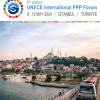News
Displaying Results 1 - 25 of 52
The Fourth Cycle of UNECE Environmental Performance Reviews (EPR) is underway with the fourth review of Montenegro, carried out under the leadership of UNECE.
A large, multidisciplinary team of international experts worked in Podgorica from 22 to 30 April 2024, assessing the environmental…
Addressing the Tashkent International Investment Forum (2-3 May 2024), UNECE Executive Secretary Tatiana Molcean called for the mobilization of private sector investments to support the implementation of the Sustainable Development Goals (SDGs) and to foster regional cooperation in Central Asia.…
As we move beyond the midpoint of the 2030 Agenda and with only 12% of the Sustainable Development Goals (SDGs) on track, an immediate, globally coordinated push to meet the 2030 deadline is urgently needed. Sustainable Public-Private Partnerships (PPPs) and infrastructure finance are central in…
Preventing accidental water pollution remains a key challenge for many countries within and beyond the UNECE region. Approximately 60% of the world’s freshwater flows occur in transboundary river basins where 40% of the world’s population live. Countries rely increasingly on transboundary water…
Air pollution levels in Georgia are considered unhealthy with annual average of fine particles PM2.5 exceeding the World Health Organization's air quality guideline by at least three times.
To support Georgia in further improving its air quality management system, a new EU-funded project,…
Infrastructure projects are crucial for sustainable development, impacting not just economies but also communities and the environment. The tangible benefits they bring to people's lives can have a transformative effect and contribute to achieving the Sustainable Development Goals (SDGs). However,…
The Sustainable Development Goals (SDGs) require a massive transformation of our economies and societies, and a shift towards more sustainable patterns of production and consumption. Public-Private Partnerships (PPPs) are a powerful tool to support this transformation, as they can mobilise private…
The Government of Ukraine is committed to rebuilding its infrastructure with a focus on achieving the Sustainable Development Goals (SDGs) and pursuing a resilient, inclusive and sustainable recovery.
However, the reconstruction and recovery needs of Ukraine are enormous and were estimated by…
Infrastructure is crucial for social and economic development. To achieve the 2030 Agenda for Sustainable Development, infrastructure needs to be green, climate resilient, circular, inclusive and fiscally sustainable, with people as the main beneficiaries. Infrastructure is also needed to rebuild…
In the UNECE region, the Fourth Cycle of Environmental Performance Reviews (EPR) kicks off with the review of Tajikistan, carried out for the fourth time under the leadership of UNECE.
A large, multidisciplinary team of international experts worked in Dushanbe from 6 to 15 November 2023,…
On the World Day of Remembrance for Road Traffic Victims, the UN Road Safety Fund is launching the third edition of its #moments2live4 Campaign to put the spotlight on the hidden heroes of road safety.
As we ‘Remember, Act and Support’ the victims of road traffic crashes, the global Campaign calls…
Turkmenistan has made significant progress in increasing the share of the non-state sector in its GDP (excluding fuel and energy), which reached 71.1% in 2022. Public-Private Partnerships (PPPs) are considered by Turkmenistan as an important tool to further advance the implementation of the SDGs…
Sustainable and climate finance needs in Central Asia are considerable, with an estimated 38 billion US dollars per year up to 2030. On the other hand, the total foreign direct investment flows in the region in 2022 amounted to 10 billion US dollars. The infrastructure finance gap is therefore huge…
Since 2009 when Public-Private Partnerships (PPPs) were introduced in Kyrgyzstan, 66 projects have been implemented in the country, providing access to critical public services to more than 1 million citizens. These PPP projects are the driving forces of the economic and social development in…
Bosnia and Herzegovina and Serbia are in the process of adopting road safety strategies and actions plans that rely on modern tools. In both countries, road safety audit and road safety inspection are recognized by legislation, but in-depth analysis of road crashes is still not part of the…
The building industry currently accounts for 39% of global energy-related CO2 emissions, 11% of which result from manufacturing building materials and products such as steel, cement, and glass. And yet, to date, emission reduction efforts have not really focused on decarbonizing the construction…
For some time now, Uzbekistan has been engaged in various activities under the UNECE Convention on Access to Information, Public Participation in Decision-making and Access to Justice in Environmental Matters (Aarhus Convention).
An international round table entitled “Aarhus Convention: Effective…
The mandatory wearing of safety-belts in cars first introduced in Europe at the turn of the 1970s has saved millions of lives around the world in the past 50 years.
According to the World Health Organization, the use of safety-belts by occupants of vehicles in front seats reduces the risk of…
The world is facing multiple global crises and the 2030 deadline for achieving the Sustainable Development Goals (SDGs) is fast approaching. More and faster investment in sustainable infrastructure that supports the 2030 Agenda for Sustainable Development is therefore needed. Public-Private…
On the occasion of the 7th UN Global Road Safety Week, UNECE together with UNICEF Uzbekistan and the Ministry of Interior of Uzbekistan organized a workshop to discuss how to improve the national road safety system in the country.
The workshop kicked off with a policy dialogue with national road…
While many of us have taken pain relievers, we do not always remember that one of the most extensively used medicines in the world – with an estimated annual consumption of 40,000 tons – salicylic acid, commonly known as aspirin, is based on a tree-derived ingredient.
The theme of this year’s…
While Uzbekistan has improved its environmental performance in line with the Sustainable Development Goals (SDGs) related to water and sanitation (SDG 6) and forests and tree cover loss (SDG targets 15.1, 15.2, 15.3), significant challenges remain related to air quality (SDG 11.6), water resources…
A dilemma has galvanised the Public-Private Partnerships (PPPs) and infrastructure community for some time: How to ensure the bankability of pipelines of sustainable projects in emerging economies. PPP lenders and debt-providers continue to argue that there are not enough bankable projects to…
Armenia has been a pioneer in the use of the Public-Private Partnerships (PPPs) model in the Caucasus to improve its infrastructure and public services. In 2000, nine years since its independence, it concluded its first wave of water concession agreements for the provision of drinking water and…
Kyrgyzstan has been one of the pioneers of Public-Private Partnerships (PPP) in Central Asia, with the introduction of a PPP model in its legal and regulatory framework since 2009, and the most recent PPP legislation enacted in 2021. On the back of this PPP experience, the Government has launched…

























